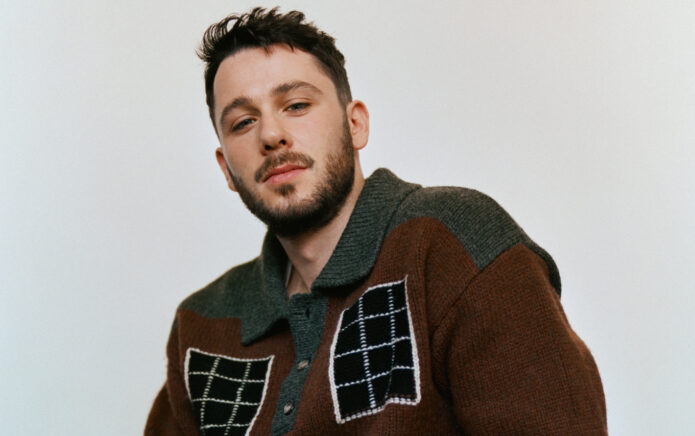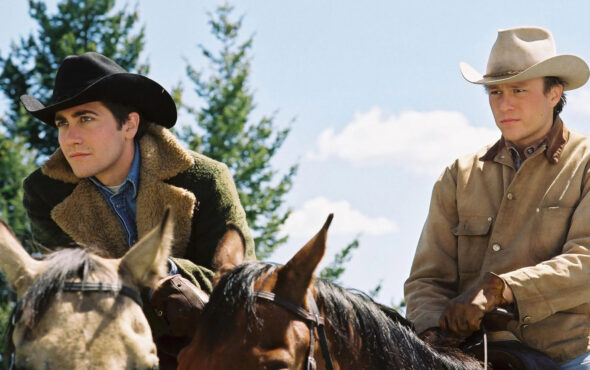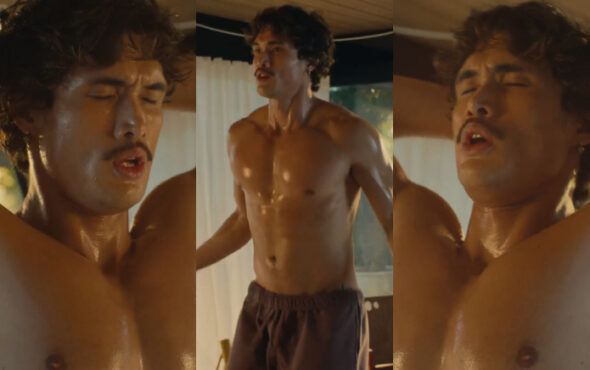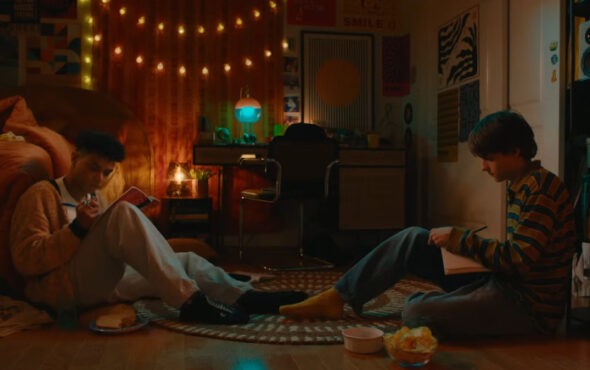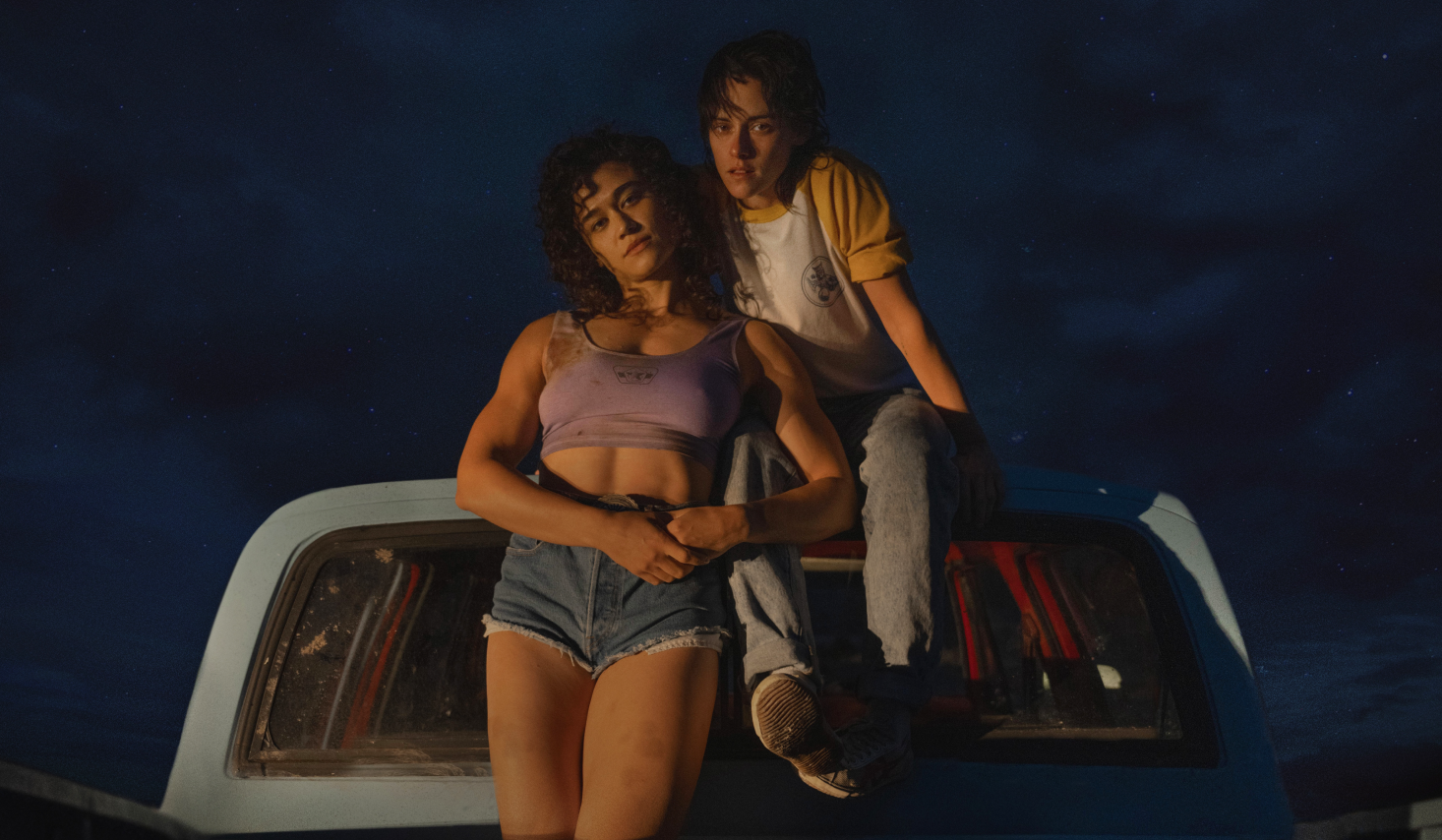
Set in the late 80s, Love Lies Bleeding is a seedy, sexy sapphic thriller brimming with small-town vengeance and slick getaways. Starring Kristen Stewart (Lou) and Katy O’Brian (Jackie), bisexual English director Rose Glass delivers a blood-splattered crime noir that already feels like a sweaty, souped-up queer classic.
When we meet Stewart’s character, a dishevelled and dissatisfied gym manager, Lou, who lazily labours unclogging toilets, her life amounts to little more than mundane tasks and dodging her avoiding her obsessive ex-girlfriend Daisy (Anna Baryshnikov). It isn’t until we hear mention of her dad, Lou Sr. (Ed Harris), a long sought-after criminal ringleader. Suddenly, Lou’s laborious day-to-day takes a turn when O’Brien’s Jackie, a charismatic, ripped, amateur bodybuilder, catches Lou’s attention. Soon enough, what begins as a crush develops into something much more dangerous. As Lou introduces Jackie to steroids, we see their romance propel forward, watching as self-destructive behaviours threaten their gritty romance.
Love Lies Bleeding deals in excess, proving that love and drugs aren’t so different after all. As Lou introduces Jackie to steroids, we see their hopped-up romance. Its thrumming synth soundtrack and brightly-coloured clothing can’t take away from the chilling choices made as Lou and Jackie get wrapped up in a violent reality they cannot escape.
So, as Katy O’Brian takes to the big screen armed with her biggest role yet, we caught up with the star to hear her thoughts on being typecast, the grimy alternative plot details of Love Lies Bleeding, and why Star Wars fans hate her for “making The Mandalorian gay”.
The story of how you responded to a casting call for Jackie’s role in Love Lies Bleeding – by tweeting a bodybuilding photo of yourself – went viral. What happened after that moment?
It’s gotten to the point where now people think that I booked it just because I replied to a tweet but I did that kind of as a joke. I don’t do a lot on social media so I went back and forth as to whether I should even reply because it feels so silly and then I just was like “screw it!” I did it because I wanted the part that bad. A friend sent me the open casting call and I was like ‘why did I not get an audition for this?’ It’s insane. Kristen Stewart, Rose Glass, it’s A24 and it’s a female bodybuilder from the Midwest – this is me.
So, I made a PowerPoint presentation and I sent my old bodybuilding pictures and competition photos to my agent. I was like ‘if don’t get an audition for this I’m going riot’. I got a call back where I got to chat with Rose. I didn’t even know it was based in the 80s. It wasn’t until after my callback that I got the scripts and was like… ‘what have I gotten myself into?’
Jackie’s story is even rougher in the scripts than it was on screen. There was a lot that I was terrified but I thought, ‘I’m not going to improve as an actor if I don’t do this role’. So, I had my chemistry [read] the next day and I met Kristen and we chatted about the movie. She was super chill and excited about it and that was refreshing. I then had audition, after audition, after audition after that and, finally, they offered me the role two weeks before we started filming.
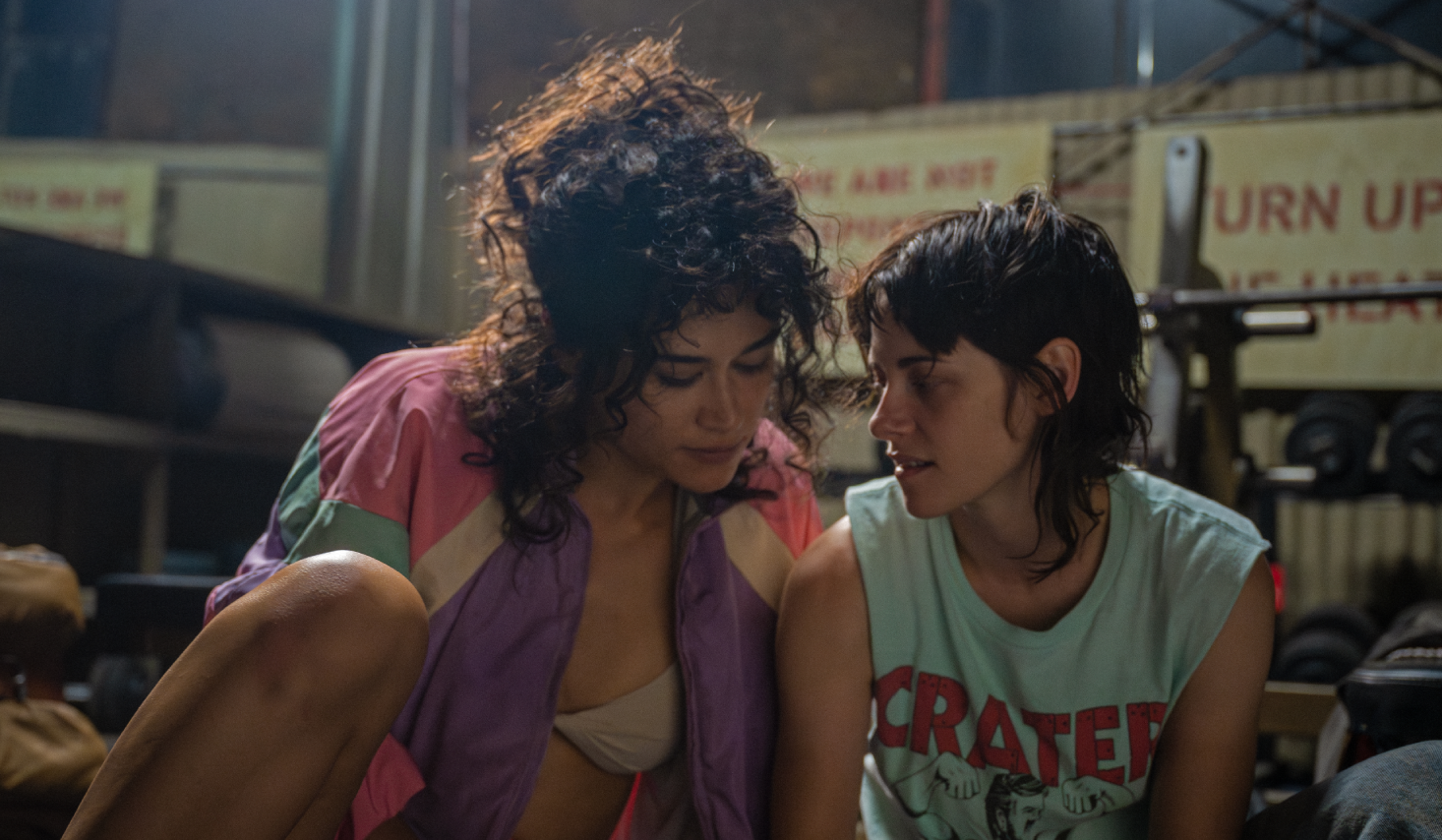
A24 has given us some of our favourite queer characters, like Josie and Hazel from Bottoms, who are tied to a unique script and plot. Love Lies Bleeding is no different. What did you find challenging about Jackie’s character?
I knew there would be a physical element on top of everything, and I’ve done bodybuilding competitions before. It was something that I had a formula for my brain but I also have Crohn’s disease, which I didn’t have when I was a bodybuilder, so it’s like will I have the energy to do all this after a full day of filming? It turns out that when you’re eating really healthy and working out, you do.
The other thing was that there’s all these intimate scenes. I’d never really, in a professional setting, gotten to do really intimate stuff. So, I was a little nervous about that – not necessarily of the performance aspect – but of making sure that it was comfortable mostly for Kristen. If something makes me uncomfortable I just don’t do it and I didn’t want to offend anybody.
There’s also a huge emotional arc for Jackie and part of that, originally, she goes through even more humiliation. I had this hesitation for a moment. Originally in the bodybuilding competition, for instance, Jackie throws up and pisses herself and it’s this double whammy of what else can go wrong and my fight with Lou was even worse. [Jackie] was just so awful at times and, in the end, I was supposed to [arrive on screen[ as a giant but butt naked. So, I didn’t know if I was emotionally able to play something this humiliating and tragic. At the end of the day, the more I thought about it, the more I picked up who Jackie was as a person and it was easy.
How did having Kristen Stewart and director Rose Glass, two LGBTQIA+ colleagues, help with feeling comfortable on set?
You know what’s funny is that I never asked about Rose’s sexuality, so I didn’t know until recently whether she was queer or not. [Earlier in my career] I had done a short film that I don’t think we’ll ever see the light of day. I had a kissing scene with another girl and she was visibly uncomfortable kissing a woman. I did everything I could saying, ‘If you’re not comfortable, you don’t have to do that’. She was like ‘no, I am’ but it was so obvious.
It just made me feel disgusting and so it was one of those things where it was good to know that I was working with someone who was also queer, who wasn’t disgusted by the idea of being with a woman and didn’t make me feel gross. But, also, we have a real understanding of how [queer] relationships work and saw a lot of the humour in it, even the toxic aspects of it. We were able to play that in a genuine way which makes [our] scenes and this movie special.
You’ve previously spoken about viewers presuming your characters, like in The Mandalorian, are queer even if they’re not. How was this different for Love Lies Bleeding?
It was really fun to not even think about it as a queer movie – it was like, ‘I happen to love a woman, that’s my life and I don’t second guess it’. It’s funny because I was at a panel and someone asked what it’s like to play all these gay characters and I’ve only ever played one gay character and it was in Love Lies Bleeding. Other than that, I just show up on screen and you assume I’m gay, so it works both ways. Some people are like that’s amazing and some people literally hate me for making The Mandalorian gay. But I didn’t, I just showed up, I didn’t have sex with anyone on screen and I didn’t kiss anyone, I didn’t flirt. [Love Lies Bleeding] was definitely freeing in that it was like, ‘Yeah, this is gay’. There’s no coding, no guessing. If it’s not for you, don’t go see it.
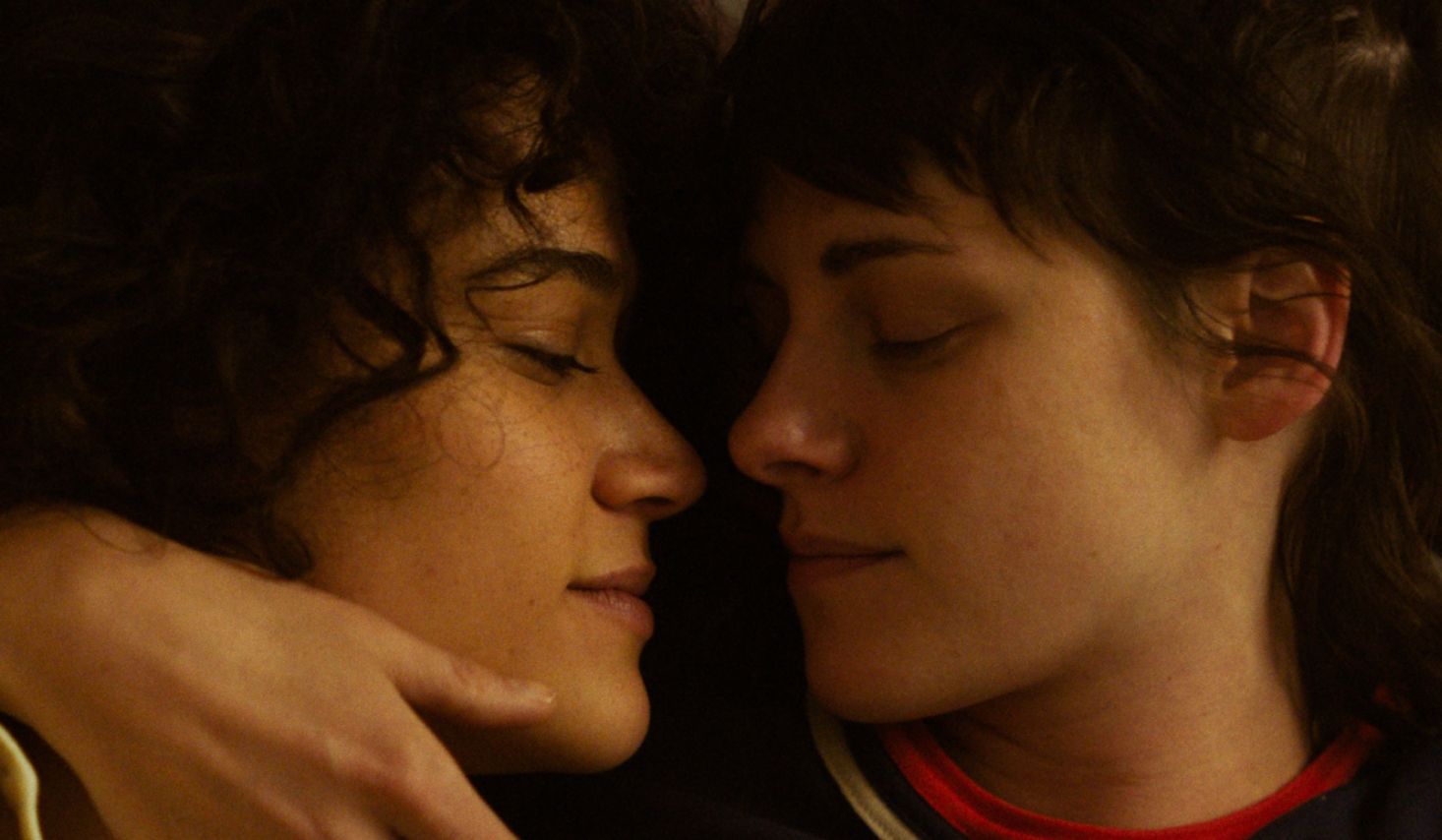
We’re seeing a sapphic cultural renaissance as more queer films like Love Lies Bleeding, Drive Away Dolls, Bottoms and Bodies, Bodies, Bodies are being made. What’s it like being on the inside of this growing on-screen moment?
After this movie, I’ve gotten a lot more opportunities to read for bigger roles. I don’t know if you’ve seen Under The Bridge – it’s Lily Gladstone’s new show but it’s also very queer and they just happen to be gay. It seems like there’s going to be more opportunities [for queer actors]. I’m also hoping that there will be more opportunities for someone who looks like me to play other roles in the spotlight that aren’t military or villainous, which I still get sent a lot of. It takes a lot for me to want to do that anymore. So in terms of my perception of what I receive, it’s still a lot of sci-fi, a lot of the superhero genre. I’m hoping to see more people thinking outside the box. I’d love to do a rom-com. I’d love to do other things that don’t stick me in a box that we’re already comfortable with.
The presence of desire is pronounced throughout this movie, from personal growth to love interests. Ambition steers Jackie, but so does her passion and infatuation with Lou – which we see grow into love. Do you see love as an act of self-liberation for Jackie and Lou?
It was like a drug. If you’ve ever fallen in love, it catches you off guard and sends you spiralling and it’s like this weird obsession, at least for Jackie’s character. It was something that could have, and did, derail her. Her love for Lou sent her on a murdering spree. It completely changed who she was as a person.
For Lou, it was her way out of this family dynamic that she hated, essentially, it was changing her life that was so stagnant. Even though you love your family, for instance, you can love your family and dislike them, disapprove of them or be frustrated at the same time or disapprove of them and take your space in a different way. [Jackie] is not less toxic, necessarily, than Lou’s family, but she’s the one that she chooses to go with.
Early on, we’re introduced to Jackie’s dream of going to Vegas and we watch as her bodybuilding goal doesn’t actualise in the way she’s hoped. She places everything on this perfect ideal of winning, moving away and having that American Dream-esque escape. What lessons did you learn from Jackie’s failure?
I think that’s reality. You can make all these expectations that you want but it’s not going to turn out the way you want it to and that’s, literally, the moment in the film where reality hits and what she’s done finally catches up to her in her mind. I studied psychology in college and so I wanted to psychoanalyse the whole thing but that’s just where Jackie has to grow and everything catches up with her. Her innocence is ruined, essentially, and she realises the consequences of her actions all at once and it affects her dream. We can all have big dreams and go out and pursue them and it can’t always work out the way we want it to. The way that we respond to that is how we grow or not.
Do you think Jackie and Lou should’ve done anything different?
It would have been a much more boring story if she hadn’t done steroids or, maybe, you shouldn’t kill people. It was either you leave stuff in the hands of fate or take matters into your own hands. It was important that this was set in this wild west atmosphere with this guy who runs the town so that you have this sense of helplessness that you have to [make a difficult choice]. So, I don’t know, I think they should have skipped town right away.
